Steve Bruce facts for kids
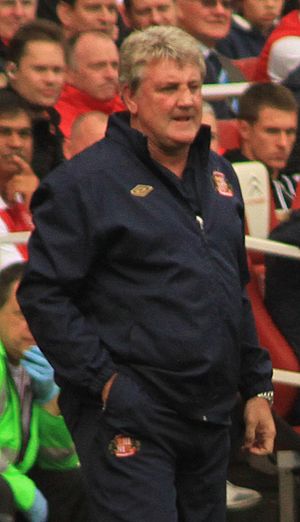
Bruce in 2011
|
|||
| Personal information | |||
|---|---|---|---|
| Full name | Stephen Roger Bruce | ||
| Date of birth | 31 December 1960 | ||
| Place of birth | Corbridge, England | ||
| Height | 6 ft 0 in (1.83 m) | ||
| Position(s) | Centre-back | ||
| Team information | |||
|
Current team
|
Blackpool (head coach) | ||
| Youth career | |||
| 1977–1979 | Gillingham | ||
| Senior career* | |||
| Years | Team | Apps | (Gls) |
| 1979–1984 | Gillingham | 205 | (29) |
| 1984–1987 | Norwich City | 141 | (14) |
| 1987–1996 | Manchester United | 309 | (36) |
| 1996–1998 | Birmingham City | 72 | (2) |
| 1998–1999 | Sheffield United | 10 | (0) |
| Total | 737 | (81) | |
| International career | |||
| 1979–1980 | England Youth | 8 | (1) |
| 1987 | England B | 1 | (0) |
| Managerial career | |||
| 1998–1999 | Sheffield United | ||
| 1999–2000 | Huddersfield Town | ||
| 2001 | Wigan Athletic | ||
| 2001 | Crystal Palace | ||
| 2001–2007 | Birmingham City | ||
| 2007–2009 | Wigan Athletic | ||
| 2009–2011 | Sunderland | ||
| 2012–2016 | Hull City | ||
| 2016–2018 | Aston Villa | ||
| 2019 | Sheffield Wednesday | ||
| 2019–2021 | Newcastle United | ||
| 2022 | West Bromwich Albion | ||
| 2024– | Blackpool | ||
| *Club domestic league appearances and goals | |||
Stephen Roger Bruce (born 31 December 1960) is an English football manager and former player. He played as a centre-back for twenty years. Currently, he is the head coach for EFL League One club Blackpool.
Steve Bruce was born in Corbridge, England. As a schoolboy, he was a talented footballer. However, many professional clubs turned him down. He almost quit football before getting a trial with Gillingham. He joined them as an apprentice and played over 200 games. In 1984, he moved to Norwich City, where he won the League Cup in 1985.
In 1987, Bruce joined Manchester United. There, he achieved great success, winning twelve trophies. These included three Premier League titles, three FA Cups, one League Cup, and the European Cup Winners' Cup. He was the first English player in the 20th century to captain a team to the Double (winning the league and FA Cup in the same season). Despite his success, he never played for the England national team. Many experts believe he was one of the best English players of his time not to play for his country.
Bruce started his managing career with Sheffield United. He also managed Huddersfield Town, Wigan Athletic, and Crystal Palace. In 2001, he became manager of Birmingham City. He led Birmingham to the Premier League twice. He left in 2007 for a second time as manager of Wigan. After that, he managed Sunderland from 2009 to 2011.
In 2012, he became manager of Hull City. He led Hull to two promotions to the Premier League. They also reached the 2014 FA Cup Final before he left in 2016. He then managed Aston Villa and Sheffield Wednesday. In July 2019, he took over at Newcastle United. He kept them in the Premier League during the COVID-19 pandemic. He left Newcastle in November 2021 after managing his 1,000th club game. In February 2022, Bruce became manager of West Bromwich Albion, leaving in October 2022. He was appointed head coach of Blackpool in September 2024.
Contents
Early Life and Football Beginnings
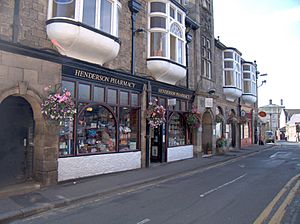
Steve Bruce was born in Corbridge, Northumberland. He was the older of two sons. His family lived near Wallsend. Bruce went to Benfield School.
He was a big fan of Newcastle United as a boy. He used to sneak into their stadium, St James' Park, to watch games. He said, "I have always been a Newcastle lad." Like many other future professional players from the area, he played football for Wallsend Boys Club. At 13, he was a ball boy at the 1974 Football League Cup Final at Wembley.
Many professional clubs, including Newcastle United, turned Bruce down. He was about to start work as a plumber. Then, Gillingham, a Third Division club, offered him a trial. Their manager, Gerry Summers, saw him play in a youth tournament. Gillingham signed Bruce as an apprentice. At first, Bruce played as a midfielder. However, he was moved to play in the centre of defence. This change was made by Bill Collins, who Bruce says was the biggest influence on his career.
Playing Career Highlights
Starting at Gillingham
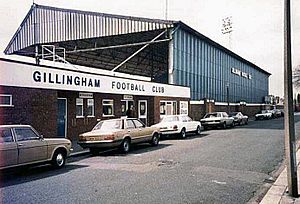
Bruce played for Gillingham's reserve team in the 1978–79 season. Even as a defender, he scored 18 goals and was the top scorer. In January 1979, he played for the England youth team. He earned eight caps and played in the 1980 UEFA European Under-18 Championship.
He made his senior debut for Gillingham on 11 August 1979. This was in a League Cup game against Luton Town. He quickly made an impact and won the club's Player of the Year award in his first season. He played over 200 games for Gillingham. He was also chosen twice for the Professional Footballers' Association's Third Division Team of the Year.
Bruce decided not to sign a new contract with Gillingham in 1984. He knew clubs from higher divisions were interested in him. In 1983, he broke his leg during a game, which kept him out for six months. He returned to play a key role in Gillingham's FA Cup games against Everton in 1984. This attracted more attention from top clubs. He eventually joined Norwich City in August 1984. In 2009, he was added to Gillingham's Hall of Fame.
Success with Norwich City
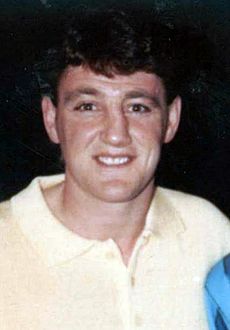
Bruce scored an own goal in his first minute playing for Norwich against Liverpool in the 1984–85 season. However, he went on to score the winning goal in the League Cup semi-final against Ipswich Town. He was named man of the match when Norwich won the final. Bruce was voted Norwich City Player of the Season. Despite this, the team was relegated to the Second Division.
Bruce played in every game as Norwich won promotion back to the top division in the 1985–86 season. He then became club captain. The next season, he helped the club finish fifth in the league, their highest position at the time.
In 1987, he captained the England B team in a match against Malta. This was his only appearance for England. He is often called one of the best defenders of his time who never played for the main England team. Bruce later said that former England manager Bobby Robson told him he should have been capped.
Big clubs became interested in Bruce in late 1987. Manchester United was the main club wanting to sign him. Bruce really wanted to join them. The deal was almost off when Norwich asked for more money. Bruce refused to play for Norwich until the move happened. On 17 December 1987, he officially left Norwich City. In 2002, Norwich fans voted him into the Norwich City Hall of Fame.
Becoming a Legend at Manchester United
Bruce made his Manchester United debut on 19 December 1987. United won 2–1 against Portsmouth. He played in most of United's remaining games, helping them finish in the top two. The next season, the team finished in the middle of the table. Manager Alex Ferguson then brought in new players, including Gary Pallister.
Bruce and Pallister formed a strong partnership in defence. In 2006, then-United captain Gary Neville called them the best defensive pair in the club's history. They were nicknamed "Dolly and Daisy." Bruce and Pallister were part of the team that won the 1990 FA Cup Final against Crystal Palace.
After English clubs were allowed back into European competitions, United played in the European Cup Winners' Cup in the 1990–91 season. Bruce played regularly and scored three goals as the team reached the final against FC Barcelona. United won the game 2–1. This was a high-scoring season for Bruce, who scored 19 goals in all competitions. He also played in the League Cup final, which United lost to Sheffield Wednesday.
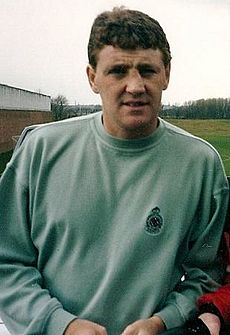
Bruce missed several weeks of the 1991–92 season due to a hernia operation. That season, Leeds United beat Manchester United to the championship. Bruce helped United win their first-ever League Cup in April 1992. He captained the team in the final because Bryan Robson was injured.
Injuries continued for Robson in the 1992–93 season. This meant Bruce captained United in most games during the first season of the new Premier League. Bruce scored two late goals in a win over Sheffield Wednesday. These goals were key to United winning the first Premier League title. It was the first time the club had won the English championship since 1967. Bruce and Robson lifted the trophy together.
At the peak of his success, Bruce was contacted by Jack Charlton, manager of the Republic of Ireland. Bruce was eligible to play for Ireland because of his mother's birthplace. However, his earlier games for the England Youth team meant he could not play for another country's senior team.
United dominated English football in the 1993–94 season. They won a second Premier League title. Then, they beat Chelsea in the FA Cup final. This made them only the fourth team to win the Double in the 20th century. Bruce was the first English captain to achieve this. The 1994–95 season was not as good for Bruce and United. They did not win a third Premier League title and lost the FA Cup final to Everton.
During the next season, three clubs offered Bruce a manager's job. However, Alex Ferguson did not let him leave. Bruce still played 30 Premier League games. United came back from 12 points behind Newcastle United to win the championship again. A week later, Bruce was not in the squad for the FA Cup final due to a minor injury. After the game, Eric Cantona, who captained the team, tried to get Bruce to lift the trophy. But Bruce refused. Ferguson denied that Bruce's absence meant he was leaving. However, Bruce chose to join Birmingham City on a free transfer. He signed a contract worth almost £2 million over two years.
Later Playing Career
Birmingham manager Trevor Francis signed Bruce and four other former Premier League players. They wanted experienced players to help the team get promoted. Bruce became team captain. However, he often disagreed with Francis.
In the 1997–98 season, Bruce was left out of the team more often. This led to public arguments. At the end of the season, he became player-manager of Sheffield United. He played 11 matches for the club before retiring as a player. His last game was on 28 November 1998.
How Steve Bruce Played
Early in his career, Bruce's playing style was very energetic. He later described it as "rampaging." This sometimes caused him to get into trouble with referees. Over time, he became a strong and reliable player. People said he made the most of his natural talent.
When he was at his best, Bruce was known for his calm and accurate passing. He was also good at controlling the ball under pressure, often with his chest. He was also known for scoring many goals for a centre-back. This was because he could head the ball powerfully and was good at taking penalty kicks.
Bruce was not the fastest player, but he was brave. He was willing to take hits from other players. This made him the "heart" of Manchester United's defence. He often played even when injured. For example, in 1992, he returned to the United team quickly even though he needed a hernia operation. His strong spirit and ability to motivate others were very important to the United team. Alex Ferguson praised his "determination and heart."
Managerial Career
Early Managerial Roles
In his first season as a manager, Bruce led Sheffield United to eighth place in the First Division. He caused a stir during an FA Cup match against Arsenal. Bruce felt Arsenal had broken an unwritten rule of sportsmanship. Arsenal scored a goal when United had kicked the ball out of play for an injured player. The game was later replayed. In May 1999, Bruce resigned after one season. He said there were problems with the club's owners and not enough money for new players.
He then became manager of Huddersfield Town. Huddersfield started the 1999–2000 season well. They won six games in a row and reached third place. But their form dropped, and they missed the play-offs. The team struggled at the start of the 2000–01 season. Bruce was sacked in October 2000.
He then managed Wigan Athletic in April 2001. The team reached the Second Division play-offs but lost in the semi-finals. Bruce left Wigan after less than two months to manage Crystal Palace.
Crystal Palace started the 2001–02 season strongly. However, Bruce resigned less than three months later to return to Birmingham City. Crystal Palace tried to stop him, but he was eventually allowed to join Birmingham after a compensation deal was agreed. By this time, he had a reputation for not staying at clubs for very long.
Leading Birmingham City
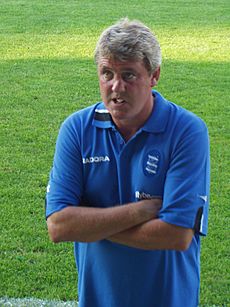
When Bruce arrived, Birmingham was in the middle of the First Division table. A long unbeaten run helped the team reach the play-offs. They beat Bruce's old club, Norwich City, in the final after a penalty shoot-out. This earned them promotion to the Premier League after 16 years.
Birmingham struggled at the start of the 2002–03 season in the Premier League. But Bruce signed Christophe Dugarry, which boosted the team. They finished 13th and higher than local rivals Aston Villa for the first time in decades.
The next season started well for Birmingham, reaching fourth place. But they finished tenth. Despite this, Bruce signed a new contract in June 2004. Two months later, Freddy Shepherd, chairman of Newcastle United, wanted Bruce as their new manager. Bruce was reportedly keen to join Newcastle, his boyhood club. However, he stayed at Birmingham. He said he had a job to do there.
After Graeme Souness was sacked as Newcastle manager in February 2006, Bruce was again linked to the job. By this time, Birmingham was struggling in the league. On 21 March 2006, they lost 7–0 at home to Liverpool in the FA Cup. Some fans wanted him to resign, but Bruce said he would keep fighting. The team climbed out of the relegation zone in April 2006. However, they were soon relegated from the Premier League.
In the 2006–07 season, Birmingham had a slow start in the Championship. After a loss to Norwich City, fans and journalists called for Bruce to be sacked. Bruce took responsibility for the team's poor form. But the team then won five league games in a row. On 29 April 2007, Birmingham secured promotion back to the Premier League. Chairman David Gold praised Bruce, saying he had been "outstanding."
Return to Wigan Athletic
In May 2007, Birmingham's board agreed to a new contract for Bruce. But the club's new owner did not approve it, making his future uncertain. In October 2007, Bolton Wanderers wanted to talk to him about their manager job, but Birmingham refused.
Later that month, Bruce and the new owner had a positive meeting. However, Bruce later said that Birmingham's managing director had treated him unfairly regarding his new contract. When Wigan Athletic asked to speak to Bruce about their manager job, he was open to it. Wigan agreed to pay Birmingham about £3 million in compensation. On 19 November, Wigan announced they had signed Bruce for a second time.
Wigan struggled against relegation for the rest of the season. But they stayed in the Premier League by beating Aston Villa near the end of the season. In September 2008, Bruce was again linked to the Newcastle United manager job. Bruce led Wigan to an 11th-place finish in the 2008–09 season.
Managing Sunderland
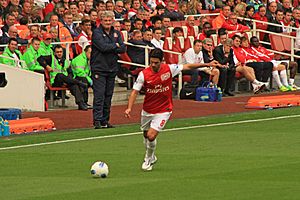
On 27 May 2009, Bruce was allowed to talk to Sunderland about becoming their new manager. He was confirmed as Sunderland's new manager on 3 June, signing a three-year contract. He brought three coaches from Wigan with him. In his first season, Bruce led Sunderland to a 13th-place finish in the Premier League.
Bruce made many changes to Sunderland's team. He signed 13 players and sold 15 in his first 18 months. On 25 February 2011, Bruce signed a contract extension until 2014. Chairman Niall Quinn said Bruce had "reshaped our squad beyond recognition."
Bruce was sacked as manager on 30 November 2011. Sunderland was in 16th place after a poor run of games. He later said his dismissal was partly because he was a fan of Newcastle United, Sunderland's big rivals.
Time at Hull City
On 8 June 2012, Bruce became manager of Championship club Hull City. He signed a three-year contract. In his first season, he led them to promotion to the Premier League. They finished second in the Championship on the last day. The next season, Hull finished 16th in the Premier League. They also reached the 2014 FA Cup Final for the first time. They led 2–0 early in the final, but Arsenal came back to win 3–2 in extra time. Reaching the final meant Hull qualified for the 2014–15 UEFA Europa League, their first European competition.
In March 2015, Bruce signed a three-year contract extension. However, a poor run of form left Hull near the bottom of the table. They needed to beat Manchester United in the final game to avoid relegation. They drew 0–0 and were relegated to the Championship.
In January 2016, Bruce won the Championship Manager of the Month award. Hull finished fourth in the season, qualifying for the play-offs. They beat Derby County in the semi-finals. In the final on 28 May, a goal from Mohamed Diamé against Sheffield Wednesday won Hull promotion to the Premier League again. Bruce said he had thought about resigning after the team's relegation. In July 2016, he was interviewed for the England manager job. Three days later, Bruce resigned from Hull City. He said he was frustrated by a lack of new player signings.
Managing Aston Villa
On 12 October 2016, Bruce became manager of Championship club Aston Villa. In his second game, Villa beat Reading. This was Villa's first win in 11 games and their first away win in 14 months. He brought in Colin Calderwood as assistant manager. In the 2017–18 season, Villa reached the play-offs. They beat Middlesbrough to reach the final. However, they lost 1–0 to Fulham and missed out on promotion. On 2 October 2018, Villa drew 3–3 at home to Preston North End after leading by two goals. A fan threw a cabbage at Bruce, and some fans called for him to leave. The next day, he was sacked by Villa due to poor results.
Sheffield Wednesday and Newcastle United
In January 2019, Bruce was appointed manager of Championship club Sheffield Wednesday. He started the following month. On 27 January, some TV pundits criticized his delay in starting the job. Bruce explained he had two operations and needed time to recover. He also needed time after his parents passed away in 2018.
BBC Sport reported in July 2019 that Bruce had resigned from Wednesday. He had admitted talking to Premier League Newcastle United about their manager job. His appointment at Newcastle was confirmed on 17 July. Sheffield Wednesday later claimed there were still legal issues with his resignation. Newcastle denied any wrongdoing. Fans had mixed reactions, as Bruce had managed rival club Sunderland. Bruce said he hoped fans would give him time to prove himself. He made six new signings, including Joelinton for a club record fee.
In his first season, Newcastle finished 13th. The next season, played mostly without fans due to the pandemic, Bruce guided the club to 12th. In October 2021, a new group bought the club. Bruce was expected to be dismissed. However, he stayed in charge and was recognized for managing his 1,000th competitive match. Newcastle lost that game 3–2 to Tottenham Hotspur. Some Newcastle fans called for Bruce to be removed during and after the game. Bruce left Newcastle by mutual agreement three days later, on 20 October 2021.
West Bromwich Albion and Blackpool
On 3 February 2022, Bruce became manager of EFL Championship club West Bromwich Albion. He signed an 18-month contract. West Brom was in sixth place at the time. He left the role eight months later, in October 2022. The team was 22nd in the division, their lowest position in over two decades.
Bruce was appointed head coach of EFL League One team Blackpool on 3 September 2024. He replaced Neil Critchley. He had a perfect start, winning his first four matches. He was named EFL League One Manager of the Month for September 2024.
Life Outside Football
Personal Life
Steve Bruce married Janet Smith in February 1983. They are both from the Hexham area and went to the same school. They have two children, Alex (born 1984) and Amy (born 1987). Alex also became a professional footballer. His father signed him for Hull City in 2012. Alex had played under his father at Birmingham City before. He left Birmingham in 2006 partly because people accused his father of nepotism (showing favouritism to family).
In September 2004, Bruce was involved in an incident outside his home. Two men tried to steal his daughter's car. He got facial injuries but still traveled to a Premier League match that day.
Other Activities
Bruce's autobiography, Heading for Victory, was published in 1994. In 1999, while managing Huddersfield, he wrote three novels: Striker!, Sweeper! and Defender! The books were about a fictional football manager, Steve Barnes, who solved mysteries. Bruce later said he was embarrassed by the books. He planned to publish a new autobiography in late 2019. However, the book was postponed because his parents passed away. He wanted to focus on his job at Newcastle.
Playing Statistics
| Club | Season | League | FA Cup | League Cup | Europe | Other | Total | |||||||
|---|---|---|---|---|---|---|---|---|---|---|---|---|---|---|
| Division | Apps | Goals | Apps | Goals | Apps | Goals | Apps | Goals | Apps | Goals | Apps | Goals | ||
| Gillingham | 1979–80 | Third Division | 40 | 6 | 0 | 0 | 4 | 2 | — | — | 44 | 8 | ||
| 1980–81 | Third Division | 41 | 4 | 1 | 0 | 4 | 3 | — | — | 46 | 7 | |||
| 1981–82 | Third Division | 45 | 6 | 5 | 1 | 2 | 0 | — | 3 | 1 | 55 | 8 | ||
| 1982–83 | Third Division | 39 | 7 | 2 | 0 | 5 | 1 | — | — | 46 | 8 | |||
| 1983–84 | Third Division | 40 | 6 | 6 | 1 | 0 | 0 | — | 0 | 0 | 46 | 7 | ||
| Total | 205 | 29 | 14 | 2 | 15 | 6 | — | 3 | 1 | 237 | 38 | |||
| Norwich City | 1984–85 | First Division | 39 | 1 | 5 | 1 | 9 | 3 | — | — | 53 | 5 | ||
| 1985–86 | Second Division | 42 | 8 | 1 | 0 | 4 | 2 | — | 6 | 0 | 53 | 10 | ||
| 1986–87 | First Division | 41 | 3 | 3 | 0 | 4 | 0 | — | 4 | 0 | 52 | 3 | ||
| 1987–88 | First Division | 19 | 2 | — | 3 | 1 | — | — | 22 | 3 | ||||
| Total | 141 | 14 | 9 | 1 | 20 | 6 | — | 10 | 0 | 180 | 21 | |||
| Manchester United | 1987–88 | First Division | 21 | 2 | 3 | 0 | — | — | — | 24 | 2 | |||
| 1988–89 | First Division | 38 | 2 | 7 | 1 | 3 | 1 | — | 3 | 1 | 51 | 5 | ||
| 1989–90 | First Division | 34 | 3 | 7 | 0 | 2 | 0 | — | — | 43 | 3 | |||
| 1990–91 | First Division | 31 | 13 | 3 | 0 | 7 | 2 | 8 | 4 | 1 | 0 | 50 | 19 | |
| 1991–92 | First Division | 37 | 5 | 1 | 0 | 7 | 1 | 5 | 0 | — | 50 | 6 | ||
| 1992–93 | Premier League | 42 | 5 | 3 | 0 | 3 | 0 | 2 | 0 | — | 50 | 5 | ||
| 1993–94 | Premier League | 41 | 3 | 7 | 0 | 9 | 2 | 4 | 2 | 1 | 0 | 62 | 7 | |
| 1994–95 | Premier League | 35 | 2 | 5 | 2 | 1 | 0 | 6 | 0 | 1 | 0 | 48 | 4 | |
| 1995–96 | Premier League | 30 | 1 | 5 | 0 | 2 | 0 | 2 | 0 | — | 39 | 1 | ||
| Total | 309 | 36 | 41 | 3 | 34 | 6 | 27 | 6 | 6 | 1 | 417 | 52 | ||
| Birmingham City | 1996–97 | First Division | 32 | 0 | 3 | 1 | 4 | 0 | — | — | 39 | 1 | ||
| 1997–98 | First Division | 40 | 2 | 3 | 0 | 2 | 0 | — | — | 45 | 2 | |||
| Total | 72 | 2 | 6 | 1 | 6 | 0 | — | — | 84 | 3 | ||||
| Sheffield United | 1998–99 | First Division | 10 | 0 | 0 | 0 | 1 | 0 | — | — | 11 | 0 | ||
| Career total | 737 | 81 | 70 | 7 | 76 | 18 | 27 | 6 | 19 | 2 | 929 | 114 | ||
Managerial Statistics
| Team | From | To | Record | Ref. | ||||
|---|---|---|---|---|---|---|---|---|
| P | W | D | L | Win % | ||||
| Sheffield United | 2 July 1998 | 17 May 1999 | 55 | 22 | 15 | 18 | 40.0 | |
| Huddersfield Town | 24 May 1999 | 16 October 2000 | 66 | 25 | 16 | 25 | 37.9 | |
| Wigan Athletic | 4 April 2001 | 29 May 2001 | 8 | 3 | 2 | 3 | 37.5 | |
| Crystal Palace | 31 May 2001 | 2 November 2001 | 18 | 11 | 2 | 5 | 61.1 | |
| Birmingham City | 12 December 2001 | 23 November 2007 | 269 | 100 | 69 | 100 | 37.2 | |
| Wigan Athletic | 26 November 2007 | 3 June 2009 | 68 | 23 | 17 | 28 | 33.8 | |
| Sunderland | 3 June 2009 | 30 November 2011 | 98 | 29 | 28 | 41 | 29.6 | |
| Hull City | 8 June 2012 | 22 July 2016 | 201 | 82 | 44 | 75 | 40.8 | |
| Aston Villa | 12 October 2016 | 3 October 2018 | 102 | 46 | 25 | 31 | 45.1 | |
| Sheffield Wednesday | 1 February 2019 | 15 July 2019 | 18 | 7 | 8 | 3 | 38.9 | |
| Newcastle United | 17 July 2019 | 20 October 2021 | 97 | 28 | 28 | 41 | 28.9 | |
| West Bromwich Albion | 3 February 2022 | 10 October 2022 | 32 | 8 | 12 | 12 | 25.0 | |
| Blackpool | 3 September 2024 | Present | 48 | 18 | 17 | 13 | 37.5 | |
| Total | 1,078 | 401 | 283 | 394 | 37.2 | |||
Honours
Player Achievements
Norwich City
- Football League Cup: 1984–85
- Football League Second Division: 1985–86
Manchester United
- Premier League: 1992–93, 1993–94, 1995–96
- FA Cup: 1989–90, 1993–94, 1995–96
- Football League Cup: 1991–92
- FA Charity Shield: 1990 (shared), 1993, 1994
- European Cup Winners' Cup: 1990–91
- European Super Cup: 1991
Individual Awards
- Premier League 10 Seasons Awards Domestic Team of the Decade
- PFA Team of the Year: Division Two (1985–86), Division Three (1982–83, 1983–84)
- Gillingham Player of the Season: 1979–80, 1981–82
- Norwich City Player of the Season: 1984–85
- Birmingham City Player of the Season: 1997–98
Managerial Achievements
Birmingham City
- Football League Championship runner-up: 2006–07
- Football League First Division play-offs: 2002
Hull City
- FA Cup runner-up: 2013–14
- Football League Championship runner-up: 2012–13
- Football League Championship play-offs: 2016
Individual Awards
- Premier League Manager of the Month: April 2021
- EFL League One Manager of the Month: September 2024
See also
 In Spanish: Steve Bruce para niños
In Spanish: Steve Bruce para niños

